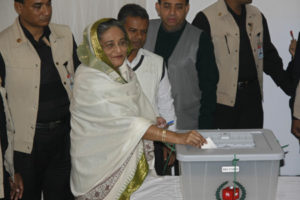
By Nava Thakuria
3 October 2023
As Bangladesh has been approaching next national elections, speculations are mounting in northeast India if the ruling Awami League (AL) party will win the polls. Without directly supporting Prime Minister Sheikh Hasina, who will seek the mandate from 140 million voters for her fourth consecutive term in office, the north-eastern political observers start debating the probable outcome and its aftermath. Most of the experts view that India wants a stable government in Dhaka, which would extend progressive alliances with New Delhi for the ensuing security, development and trades in the south Asian region.
The ruling AL won over 250 Parliamentarians in 2018 elections and continues enjoying an absolute majority in the 350-member Jatiya Sangsad. The daughter of Bangabandhu Sheikh Mujibur Rahman, enjoys the reputation and electoral advantages over the main opposition political entity Bangladesh Nationalist Party (BNP) and other parties, as many of them are inclined to radical Islamist forces. Currently, BNP’s supreme leader Khaleda Zia is not keeping well and their acting chairperson Tarique Rahman lives in London (exiled since 2008).
Notably, the BNP and its opposition allies are yet to declare their participation in the general elections, as they are demanding a caretaker administration in Dhaka to conduct the elections. Otherwise, they have decided to boycott the electoral exercise. But Hasina has already refused to step down for a neutral caretaker government prior to the polls.
Lately, rumours surface that the opposition alliance may project Professor Muhammad Yunus, the lone Nobel laureate of Bangladesh, as their leader in the January 2024 elections. The economist turned banker to the poor tried to form a political party in 2007 naming it Nagarik Shakti, however he abandoned the idea. The pioneer of microcredit movement who created Grameen Bank of Bangladesh maintains that he will never join in party politics.
But Hasina apprehends that Prof Yunus can influence the voters in the forthcoming elections. The ground reports reveal that the incumbent Hasina government may lose the elections, if it is conducted in a free and fair manner. Even though the octogenarian socio-economic thinker asserts that he has no plan to join active politics, the ruling class of Bangladesh still assumes Prof Yunus as a threat to Hasina’s political career.
So if somewhere, Hasina termed Prof Yunus as a blood-sucker of the poor in the name of poverty alleviation with micro finance initiatives, on a different occasion she publicly alleged that he blocked the World Bank approval of a loan to build a bridge over Padma river. She alleged that Prof Yunus had done it as a revenge to her for removing him from the post of managing director of Grameen Bank citing his age.
Witnessing repeated persecutions of Prof Yunus by the Hasina administration under the pretext of audits and investigations for a decade now, over 175 global leaders including Nobel laureates, elected officials, business & civil society leaders, etc. expressed serious concern and urged Hasina to suspend all legal proceedings against him. In an open letter, issued on 28 August, they termed the judicial harassment to Prof Yunus as a threat to human rights, democracy, and the rule of law in Bangladesh.
Appreciating Prof Yunus’ work as inspirational to all of them which focuses on how social business can be a force for international progress resulting in zero poverty, zero unemployment, and zero net carbon emissions, the letter added that Prof Yunus is a leading example of how Bangladesh and Bangladeshi nationals have contributed to global progress in recent decades, said the letter which was signed by Barack H. Obama, Ban Ki-moon, Hillary Rodham Clinton, Narayana Murthy, Shirin Ebadi, Orhan Pamuk, JM Coetzee, etc.
Speaking to this writer from Dhaka, a Hasina supporter argued that the ongoing legal proceedings against Prof Yunus were within the spirit of Bangladeshi laws. He also added that Hasina will welcome international experts to visit Bangladesh to observe the concerned cases. He expressed confidence that the election commission will conduct the polls in a free and fair manner, where Hasina will emerge victorious. If Hasina loses, the poverty stricken country will be in more troubles as the radical Islamists will gain strength, he asserted.
True or false, the political commentators of Northeast assume Hasina as a friend to India in general and Hindus in particular. But they often lose their logic when the minorities in the Muslim dominated country face repeated religious persecution, where Hasina remains a mute spectator. Otherwise, Dhaka has shown interest in improving connectivity with the region as both the countries have resolved to develop the road, rail and waterways. Moreover, Hasina dismantled all north-eastern militants’ camps in the country and handed over most of the separatist leaders to improve the sustainability of peace in the region.
The article appeared in the New Age Islam
